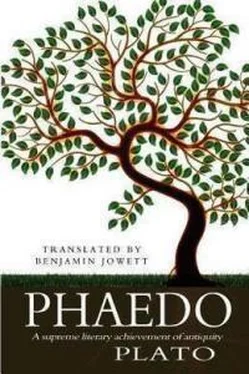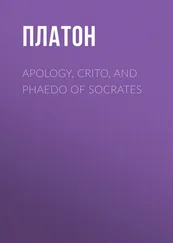Платон - Phaedo
Здесь есть возможность читать онлайн «Платон - Phaedo» весь текст электронной книги совершенно бесплатно (целиком полную версию без сокращений). В некоторых случаях можно слушать аудио, скачать через торрент в формате fb2 и присутствует краткое содержание. Год выпуска: 2014, Издательство: epubBooks Classics, Жанр: Философия, на английском языке. Описание произведения, (предисловие) а так же отзывы посетителей доступны на портале библиотеки ЛибКат.
- Название:Phaedo
- Автор:
- Издательство:epubBooks Classics
- Жанр:
- Год:2014
- ISBN:нет данных
- Рейтинг книги:3 / 5. Голосов: 1
-
Избранное:Добавить в избранное
- Отзывы:
-
Ваша оценка:
- 60
- 1
- 2
- 3
- 4
- 5
Phaedo: краткое содержание, описание и аннотация
Предлагаем к чтению аннотацию, описание, краткое содержание или предисловие (зависит от того, что написал сам автор книги «Phaedo»). Если вы не нашли необходимую информацию о книге — напишите в комментариях, мы постараемся отыскать её.
Phaedo — читать онлайн бесплатно полную книгу (весь текст) целиком
Ниже представлен текст книги, разбитый по страницам. Система сохранения места последней прочитанной страницы, позволяет с удобством читать онлайн бесплатно книгу «Phaedo», без необходимости каждый раз заново искать на чём Вы остановились. Поставьте закладку, и сможете в любой момент перейти на страницу, на которой закончили чтение.
Интервал:
Закладка:
But most by lewd and lavish act of sin,
Lets in defilement to the inward parts,
The soul grows clotted by contagion,
Imbodies, and imbrutes, till she quite lose,
The divine property of her first being.
Such are those thick and gloomy shadows damp
Oft seen in charnel vaults and sepulchres,
Lingering, and sitting by a new made grave,
As loath to leave the body that it lov'd,
And linked itself by carnal sensuality
To a degenerate and degraded state.')
That is very likely, Socrates.
Yes, that is very likely, Cebes; and these must be the souls, not of the good, but of the evil, which are compelled to wander about such places in payment of the penalty of their former evil way of life; and they continue to wander until through the craving after the corporeal which never leaves them, they are imprisoned finally in another body. And they may be supposed to find their prisons in the same natures which they have had in their former lives.
What natures do you mean, Socrates?
What I mean is that men who have followed after gluttony, and wantonness, and drunkenness, and have had no thought of avoiding them, would pass into asses and animals of that sort. What do you think?
I think such an opinion to be exceedingly probable.
And those who have chosen the portion of injustice, and tyranny, and violence, will pass into wolves, or into hawks and kites;—whither else can we suppose them to go?
Yes, said Cebes; with such natures, beyond question.
And there is no difficulty, he said, in assigning to all of them places answering to their several natures and propensities?
There is not, he said.
Some are happier than others; and the happiest both in themselves and in the place to which they go are those who have practised the civil and social virtues which are called temperance and justice, and are acquired by habit and attention without philosophy and mind. (Compare Republic.)
Why are they the happiest?
Because they may be expected to pass into some gentle and social kind which is like their own, such as bees or wasps or ants, or back again into the form of man, and just and moderate men may be supposed to spring from them.
Very likely.
No one who has not studied philosophy and who is not entirely pure at the time of his departure is allowed to enter the company of the Gods, but the lover of knowledge only. And this is the reason, Simmias and Cebes, why the true votaries of philosophy abstain from all fleshly lusts, and hold out against them and refuse to give themselves up to them,—not because they fear poverty or the ruin of their families, like the lovers of money, and the world in general; nor like the lovers of power and honour, because they dread the dishonour or disgrace of evil deeds.
No, Socrates, that would not become them, said Cebes.
No indeed, he replied; and therefore they who have any care of their own souls, and do not merely live moulding and fashioning the body, say farewell to all this; they will not walk in the ways of the blind: and when philosophy offers them purification and release from evil, they feel that they ought not to resist her influence, and whither she leads they turn and follow.
What do you mean, Socrates?
I will tell you, he said. The lovers of knowledge are conscious that the soul was simply fastened and glued to the body—until philosophy received her, she could only view real existence through the bars of a prison, not in and through herself; she was wallowing in the mire of every sort of ignorance; and by reason of lust had become the principal accomplice in her own captivity. This was her original state; and then, as I was saying, and as the lovers of knowledge are well aware, philosophy, seeing how terrible was her confinement, of which she was to herself the cause, received and gently comforted her and sought to release her, pointing out that the eye and the ear and the other senses are full of deception, and persuading her to retire from them, and abstain from all but the necessary use of them, and be gathered up and collected into herself, bidding her trust in herself and her own pure apprehension of pure existence, and to mistrust whatever comes to her through other channels and is subject to variation; for such things are visible and tangible, but what she sees in her own nature is intelligible and invisible. And the soul of the true philosopher thinks that she ought not to resist this deliverance, and therefore abstains from pleasures and desires and pains and fears, as far as she is able; reflecting that when a man has great joys or sorrows or fears or desires, he suffers from them, not merely the sort of evil which might be anticipated—as for example, the loss of his health or property which he has sacrificed to his lusts—but an evil greater far, which is the greatest and worst of all evils, and one of which he never thinks.
What is it, Socrates? said Cebes.
The evil is that when the feeling of pleasure or pain is most intense, every soul of man imagines the objects of this intense feeling to be then plainest and truest: but this is not so, they are really the things of sight.
Very true.
And is not this the state in which the soul is most enthralled by the body?
How so?
Why, because each pleasure and pain is a sort of nail which nails and rivets the soul to the body, until she becomes like the body, and believes that to be true which the body affirms to be true; and from agreeing with the body and having the same delights she is obliged to have the same habits and haunts, and is not likely ever to be pure at her departure to the world below, but is always infected by the body; and so she sinks into another body and there germinates and grows, and has therefore no part in the communion of the divine and pure and simple.
Most true, Socrates, answered Cebes.
And this, Cebes, is the reason why the true lovers of knowledge are temperate and brave; and not for the reason which the world gives.
Certainly not.
Certainly not! The soul of a philosopher will reason in quite another way; she will not ask philosophy to release her in order that when released she may deliver herself up again to the thraldom of pleasures and pains, doing a work only to be undone again, weaving instead of unweaving her Penelope's web. But she will calm passion, and follow reason, and dwell in the contemplation of her, beholding the true and divine (which is not matter of opinion), and thence deriving nourishment. Thus she seeks to live while she lives, and after death she hopes to go to her own kindred and to that which is like her, and to be freed from human ills. Never fear, Simmias and Cebes, that a soul which has been thus nurtured and has had these pursuits, will at her departure from the body be scattered and blown away by the winds and be nowhere and nothing.
When Socrates had done speaking, for a considerable time there was silence; he himself appeared to be meditating, as most of us were, on what had been said; only Cebes and Simmias spoke a few words to one another. And Socrates observing them asked what they thought of the argument, and whether there was anything wanting? For, said he, there are many points still open to suspicion and attack, if any one were disposed to sift the matter thoroughly. Should you be considering some other matter I say no more, but if you are still in doubt do not hesitate to say exactly what you think, and let us have anything better which you can suggest; and if you think that I can be of any use, allow me to help you.
Simmias said: I must confess, Socrates, that doubts did arise in our minds, and each of us was urging and inciting the other to put the question which we wanted to have answered and which neither of us liked to ask, fearing that our importunity might be troublesome under present at such a time.
Читать дальшеИнтервал:
Закладка:
Похожие книги на «Phaedo»
Представляем Вашему вниманию похожие книги на «Phaedo» списком для выбора. Мы отобрали схожую по названию и смыслу литературу в надежде предоставить читателям больше вариантов отыскать новые, интересные, ещё непрочитанные произведения.
Обсуждение, отзывы о книге «Phaedo» и просто собственные мнения читателей. Оставьте ваши комментарии, напишите, что Вы думаете о произведении, его смысле или главных героях. Укажите что конкретно понравилось, а что нет, и почему Вы так считаете.










